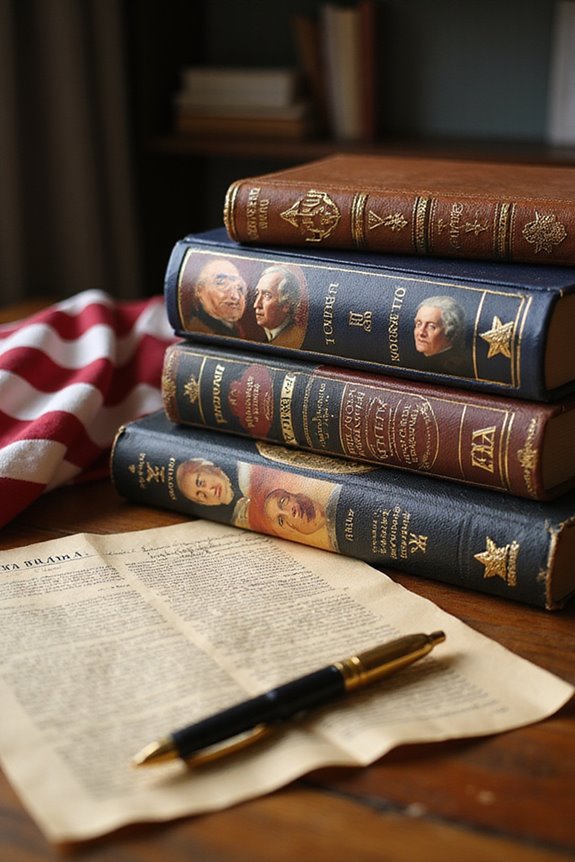When considering must-read political biographies, we recommend these influential titles:
- The Bully Pulpit by Doris Kearns Goodwin, exploring Roosevelt’s leadership during the Progressive Era.
- Alexander Hamilton by Ron Chernow, detailing Hamilton’s rise and financial policies.
- The Power Broker by Robert A. Caro, analyzing Robert Moses’s urban impact.
- Witness by Whittaker Chambers, reflecting on ideological transformation amidst Cold War espionage.
Each biography provides vital insights into American political history and influential figures. More compelling narratives await.
Key Takeaways
- The Bully Pulpit by Doris Kearns Goodwin offers insights into the Progressive Era through Roosevelt’s transformative leadership and political rivalry with Taft.
- Living History by Hillary Clinton chronicles her evolution in American politics, highlighting her advocacy for health care, education, and women’s rights amidst personal challenges.
- Alexander Hamilton by Ron Chernow provides a comprehensive look at Hamilton’s rise from poverty to a key architect of American governance and financial policy.
- The Power Broker by Robert A. Caro explores Robert Moses’s complex legacy in New York, revealing the impact of his public works projects on urban planning.
- Lincoln and the Abolitionists presents a nuanced analysis of Lincoln and Adams’s differing approaches to slavery, challenging perceptions of their commitment to abolitionism.
The Bully Pulpit by Doris Kearns Goodwin
Doris Kearns Goodwin’s “The Bully Pulpit” offers a thorough exploration of the Progressive Era and its noteworthy political transformations. This extensive work investigates Roosevelt’s leadership as a dynamic reformer and Taft’s challenges as he navigated a contrasting political landscape.
Key points include:
- The evolving relationship between Roosevelt and Taft, shifting from mentorship to rivalry, greatly influenced their political paths.
- The muckraker impact was vital; investigative journalists exposed corruption and rallied public support for reform movements.
- Goodwin employs primary sources, such as letters and diaries, to provide an intimate look at these historical figures.
- The book’s balance of scholarly research and accessibility makes it an essential read for understanding this pivotal era in American history. Additionally, it highlights the impact of the muckraking press on reform movements, which played a crucial role in shaping public opinion during the era. Furthermore, the book illustrates how the Progressive Era marked a significant shift in American political dynamics, emphasizing the necessity of reform in response to industrialization and urbanization.
Alexander Hamilton by Ron Chernow

Ron Chernow’s biography “Alexander Hamilton” stands as a monumental work that reshapes our understanding of one of America’s Founding Fathers.
- Scope and Impact: Chernow meticulously researched over 22,000 pages of Hamilton’s papers. His book became a New York Times best-seller, inspiring Lin-Manuel Miranda’s musical, which won the Pulitzer Prize for Drama.
- Hamilton’s Early Life: Born out of wedlock, Hamilton faced poverty and loss, yet his intellect propelled him to prominence. His journey reflects the historical context that shaped the evolution of American political thought.
- Military and Political Role: He served as an artillery captain and was a trusted aide to Washington. Hamilton co-authored The Federalist Papers, promoting a strong central government.
- Hamilton’s Legacy: Through his financial policies and vision, Hamilton’s contributions solidified his central role in American history, influencing contemporary political thought and governance. His extensive research process allowed for a detailed and multidimensional portrayal of Hamilton’s life.
The Power Broker by Robert A. Caro

Robert A. Caro’s “The Power Broker” is an extensive exploration of Robert Moses’s legacy and urban impact on New York. Spanning 1,336 pages, it won both the Pulitzer Prize and the Francis Parkman Prize for its detailed research and documentation.
- Moses’s Role: The book examines how Moses shaped New York’s physical and political landscape through major public works projects like the Triborough Bridge. In this context, Caro’s work highlights the importance of urban planning in shaping societal outcomes and governance.
- Power Dynamics: It reveals the complexities of power in New York politics, illustrating how Moses created a political machine that rivaled elected officials. Caro’s investigation into Moses’s controversial claims shows the deep-seated biases present in urban planning decisions.
- Urban Development: Caro highlights the consequences of Moses’s focus on automobile traffic, ultimately leading to urban decline.
This biography offers critical insights into the intersection of public authority and urban planning, making it essential reading for understanding modern New York.
Witness by Whittaker Chambers

Publication Context: Released in 1952 amid the Cold War, the book reflects the intense ideological conflict of the time.
- *Witness* serves as an autobiographical account detailing Whittaker Chambers’ ideological transformation from a committed Communist to an anti-Communist witness.
- This narrative intertwines personal history with espionage revelations, particularly around the Alger Hiss case.
- Chambers provides extensive evidence, including the infamous “Pumpkin Papers,” during Hiss’s perjury trials.
- The book critiques America’s political corruption and the moral failings of liberalism, emphasizing the internal threat of Soviet espionage. Additionally, Chambers argued that the rejection of God leads to communism, highlighting the spiritual crisis underpinning political ideologies. The exploration of emotional depth throughout his narrative enhances the reader’s understanding of the complexities involved in ideological shifts.
- With eloquent prose and dramatic storytelling, Witness remains essential reading for understanding Cold War dynamics, shaping public sentiment, and reflecting on themes of truth, loyalty, and justice amidst McCarthyism.
Personal History by Katharine Graham

In *Personal History*, Katharine Graham chronicles her journey from a sheltered upbringing to becoming a pioneering media leader at *The Washington Post*.
- Graham’s Resilience: She transformed from a private housewife into a confident businesswoman, overcoming personal and professional challenges. Her accomplishments were recognized when she became a 1998 Pulitzer Prize Winner for her contributions to literature and biography. Graham’s story reflects the importance of resilience in achieving success against the odds.
- Feminist Leadership: As one of the few female CEOs in the Fortune 500, her experiences highlighted the importance of women in leadership roles.
- Personal Struggles: Graham candidly discusses her complex relationship with her mother and the impact of her husband’s mental illness on her life.
- Legacy of Integrity: She emphasized journalistic integrity, advocating for fairness and independence in media.
Graham’s narrative is a compelling account of perseverance, illustrating her significant contributions to journalism and women’s leadership.
The Years of Lyndon Johnson by Robert A. Caro
Volume Highlights: Each volume offers unique insights into different phases of Johnson’s life, from his early years to his presidency.
- Volume 1: The Path to Power focuses on Johnson’s ambition, illustrating his rise from poverty during the Great Depression.
- Volume 2: Means of Ascent details his controversial 1948 Senate race, showcasing his legislative mastery and strategic prowess.
- Johnson’s tenure in the Senate solidifies his reputation as a master tactician, effectively maneuvering through complex political landscapes.
- As Vice President, he faced challenges, including tensions with President Kennedy and internal conflicts within the administration. His ability to manipulate influential figures is a key aspect of Caro’s meticulous research, painting a vivid portrait of Johnson as a relentless politician whose ambition shaped American legislative history.
Lincoln and the Abolitionists by Fred Kaplan
Fred Kaplan’s “Lincoln and the Abolitionists” offers a nuanced exploration of the intertwined lives and ideologies of Abraham Lincoln and John Quincy Adams, particularly regarding their antislavery views.
- Dual Political Biography: The book presents a comparative analysis of Lincoln’s and Adams’ approaches to slavery, showcasing their differing perspectives.
- Abolitionist Perspectives: Adams actively supported abolitionists like Elijah Lovejoy, while Lincoln viewed such figures as too radical.
- Lincoln’s Legacy: Kaplan challenges the perception of Lincoln as a committed abolitionist, framing him more as a gradualist focused on political feasibility. Lincoln’s limited mention of Adams in writings illustrates how their political programs were aligned yet distinct.
- Constitutional Complexities: The book critically examines how both leaders navigated constitutional compromises and moral imperatives concerning slavery.
Living History by Hillary Clinton
Hillary Clinton’s “Living History” serves as a revealing memoir that chronicles her journey through the complex landscape of American politics.
- As the First Lady, Clinton reshaped the role, focusing on health care, education, and children’s issues.
- The memoir details her political evolution, highlighting her advocacy focus and legislative impact during turbulent times.
- It addresses personal betrayal and public scrutiny, especially during Bill Clinton’s impeachment, showcasing her resilience themes. The memoir also reflects her role as a global champion for women’s rights, human rights, and democracy.
- Growing up in suburban Illinois, she shifted from a Goldwater Girl to a human rights advocate, facing gender bias in her early career.
- Clinton’s narrative provides insight into her experiences maneuvering through political turbulence, emphasizing the balance between personal life and her public responsibilities.
This memoir is essential for understanding her unique contributions to American politics.
Frequently Asked Questions
What Are the Main Themes in Each Biography?
Like threads in a tapestry, the main themes weave together leadership qualities and historical context. They reveal how ambition, loyalty, and pragmatism shape decisions, illuminating the complex interplay of personal and public life in political narratives.
How Do These Biographies Compare in Narrative Style?
When we compare these biographies, we see diverse narrative techniques and storytelling methods. Some weave primary sources seamlessly, while others adopt a more analytical tone, balancing engagement and factual depth to enhance our understanding of political figures.
Who Are the Intended Audiences for These Political Biographies?
Isn’t it fascinating how diverse audiences engage with political biographies? Academic scholars seek depth, while general readers crave insights. Together, we explore these narratives, enriching our understanding of leadership, history, and the complexities of political life.
What Are the Critical Perspectives on These Authors’ Approaches?
When evaluating authors’ approaches, we must consider authorial bias and narrative framing. These elements can greatly influence how political figures are portrayed, affecting our understanding of their actions and the broader historical context.
How Have These Biographies Influenced Public Perception of Their Subjects?
We’ve seen how political biographies shape public opinion by providing historical context. They humanize leaders, revealing complexities that influence our perceptions, often reinterpreting legacies and altering how we view their actions and decisions over time.




